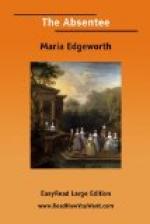grandeur—plunged into one of our great public
schools—into a new world. Forced to
struggle, mind and body, with his equals, his rivals,
the little lord became a spirited schoolboy, and, in
time, a man. Fortunately for him, science and
literature happened to be the fashion among a set
of clever young men with whom he was at Cambridge.
His ambition for intellectual superiority was raised,
his views were enlarged, his tastes and his manners
formed. The sobriety of English good sense mixed
most advantageously with Irish vivacity; English prudence
governed, but did not extinguish his Irish enthusiasm.
But, in fact, English and Irish had not been invidiously
contrasted in his mind: he had been so long resident
in England, and so intimately connected with Englishmen,
that he was not obvious to any of the commonplace
ridicule thrown upon Hibernians; and he had lived with
men who were too well informed and liberal to misjudge
or depreciate a sister country. He had found,
from experience, that, however reserved the English
may be in manner, they are warm at heart; that, however
averse they may be from forming new acquaintance,
their esteem and confidence once gained, they make
the most solid friends. He had formed friendships
in England; he was fully sensible of the superior
comforts, refinement, and information, of English
society; but his own country was endeared to him by
early association, and a sense of duty and patriotism
attached him to Ireland. And shall I too be an
absentee? was a question which resulted from these
reflections—a question which he was not
yet prepared to answer decidedly. In the meantime,
the first business of the morning was to execute a
commission for a Cambridge friend. Mr. Berryl
had bought from Mr. Mordicai, a famous London coachmaker,
a curricle, warranted sound, for which he
had paid a sound price, upon express condition that
Mr. Mordicai, barring accidents, should be
answerable for all repairs of the curricle for six
months. In three, both the carriage and body were
found to be good for nothing—the curricle
had been returned to Mr. Mordicai—nothing
had since been heard of it, or from him—and
Lord Colambre had undertaken to pay him and it a visit,
and to make all proper inquiries. Accordingly,
he went to the coachmaker’s, and, obtaining
no satisfaction from the underlings, desired to see
the head of the house. He was answered, that
Mr. Mordicai was not at home. His lordship had
never seen Mr. Mordicai; but, just then, he saw, walking
across the yard, a man, who looked something like a
Bond Street coxcomb, but not the least like a gentleman,
who called, in the tone of a master, for ‘Mr.
Mordicai’s barouche!’ It appeared; and
he was stepping into it when Lord Colambre took the
liberty of stopping him; and, pointing to the wreck
of Mr. Berryl’s curricle, now standing in the
yard, began a statement of his friend’s grievances,
and an appeal to common justice and conscience, which
he, unknowing the nature of the man with whom he had




